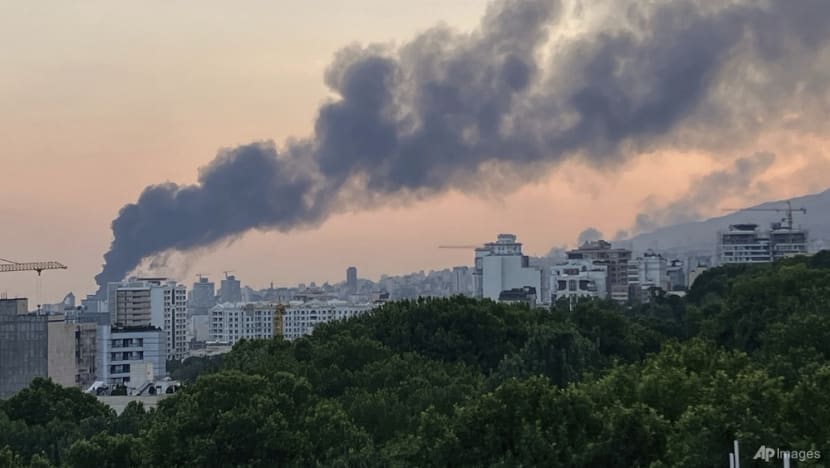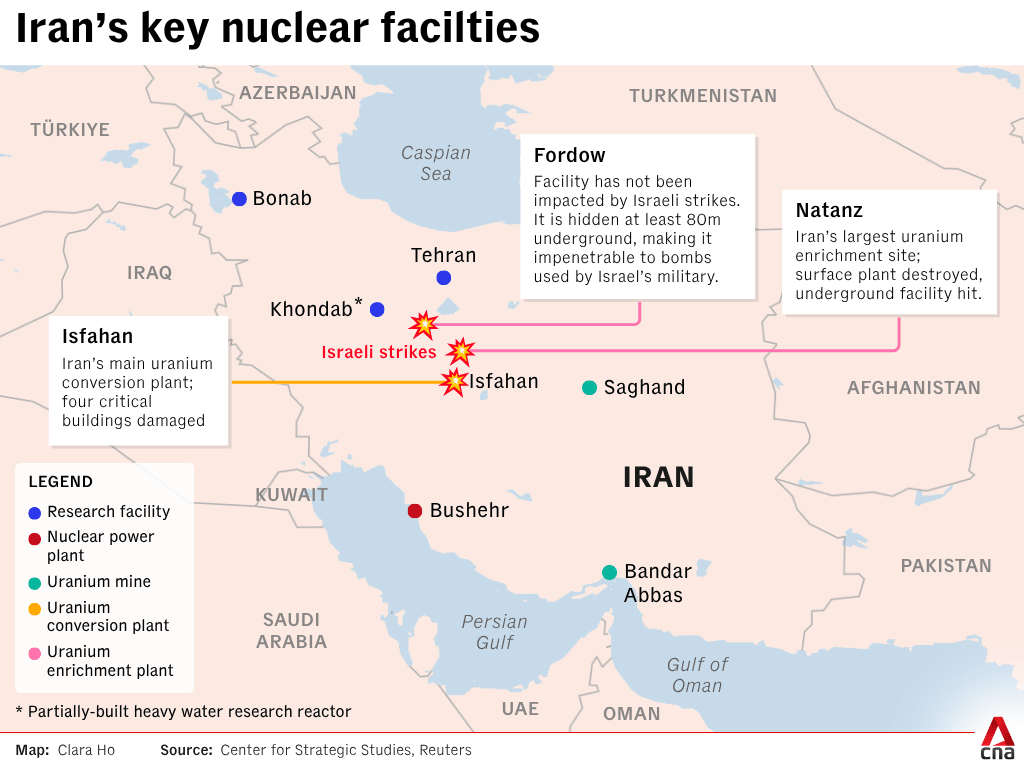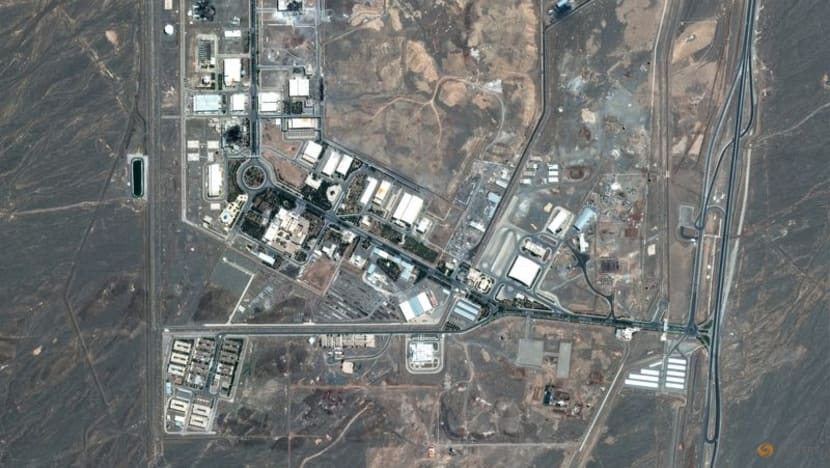https://www.channelnewsasia.com/world/israel-iran-war-trump-united-states-involvement-analysts-5189051
Israel-Iran conflict: Analysts say US likely to take direct military action
The aerial war between the two longtime, heavily armed rivals entered its sixth day on Wednesday (Jun 18).

Smoke rises from the building of Iran's state-run television after an Israeli strike in Tehran, Iran, Jun 16, 2025. (Photo: AP)
As the Israel-Iran aerial war enters its sixth day on Wednesday (Jun 18), speculation is mounting that the United States is considering joining its ally Israel in direct military action against Tehran.
US President Donald Trump on Tuesday called for Iran’s “unconditional surrender”, warning that Washington’s patience was wearing thin.
He has reportedly spoken to Israeli Prime Minister Benjamin Netanyahu over the phone, while the US military is said to be deploying more aircraft to the Middle East, including fighter jets and refuelling tankers.
Analysts told CNA this could mean Trump bringing the US into the conflict, though they cautioned it remains tough to tell for certain.
“Calling for the unconditional surrender of a sovereign nation state is pretty extreme. We haven’t heard that rhetoric very often,” noted politics professor Stephen Zunes from the University of San Francisco.
“It has really sent some shock waves and is making people think that this is not just going to be a series of strikes against Iranian nuclear facilities, but something much bigger.”
He pointed to how Israel’s military and Trump have urged residents to evacuate from Iran’s capital city of Tehran, which has a population of more than 9 million.
“There, indeed, could be a much bigger war, and the United States itself might get involved,” Zunes said.
In Iran, officials have reported at least 224 deaths, mostly civilians. In Israel, officials said 24 civilians have been killed.
TRUMP ADMINISTRATION “STUCK BETWEEN 2 CAMPS”
Reuters on Wednesday, quoting a source familiar with internal discussions, reported Trump and his team are considering several options, including joining Israel on strikes against Iranian nuclear sites.
Israel said its assault on Iran is necessary to prevent the country from building a nuclear weapon, which Israel sees as an existential threat.
Iran maintains that its nuclear programme is peaceful.

Eyal Mayroz, a senior lecturer of peace and conflict studies at the University of Sydney, said it is difficult to predict Trump’s moves.
But he noted that the Trump administration is “stuck between two camps”.
“The populists are adamantly against any kind of unprovoked US intervention, while the old guard among the Republican Party are more supportive of Israel. How that will play out is difficult to tell,” Mayroz told CNA’s Asia First.
“But I think the risks now to an American intervention remain the same – that Iran may target US assets or US allies in the Gulf. The Americans are, I think, cautious about that, which doesn't prevent Trump from making all kinds of threats.”
Such targeting of American interests could prompt Trump to get the US involved, but Iran is unlikely to do so on purpose as it already has its hands full with Israel, added Mayroz.
WHY DOES TRUMP WANT IRAN TO SURRENDER?
Trump’s comments on Tuesday came after Tehran asked Qatar, Saudi Arabia and Oman to press the American president to use his influence on Israel to agree to an immediate ceasefire.
Trump said he is looking for a “real end” to the conflict, not just a ceasefire.
Zunes told CNA938 that the US president is insisting on Iran’s surrender instead of pushing Israel to end its air strikes because he “just wants to weaken Iran as much as possible”.
“If he was really concerned about Iran not getting a nuclear weapon, he would not have ended up tearing up the Joint Comprehensive Plan of Action,” Zunes added, referring to the 2015 international deal with Iran that froze its nuclear programme.
Trump pulled the US out of the deal three years later, spurring Iran to renew its race for a nuclear bomb.
Since Trump’s return to the White House in January, he has sought a new nuclear agreement with Iran.

Zunes said: “This wasn’t something that couldn’t have been solved diplomatically. Iran was scheduled to go to Oman this coming Sunday for another round of (US-Iran nuclear) talks, so this is about something much bigger.
“This is, frankly, I think, about exerting American hegemony,” he added, referencing the US’ invasion of Iraq in 2003 and Washington’s tendency to target regional powers that challenges American influence in the Middle East
The White House has also discussed the idea of meeting directly with the Iranians this week. However, Trump has appeared noncommittal on renewing talks, saying: “I’m not too much in the mood to negotiate.”
Trump reportedly sees the US-made 30,000-pound “bunker buster” bomb, which could destroy Iran’s hard-to-reach underground nuclear sites like Fordow, as key leverage.
Mayroz said that while the Iranians “would never go” for an unconditional surrender, a key question is when and what will get them to agree to go back to the negotiating table.
“A lot depends on how they can project what they are doing as not defeat, but as victory - or at least not a full defeat,” he added.
“This will take time, I think, some days more, before they're ready to do that, or depending on any kind of escalation. But Iran is a huge country of 90 million people. It has a solid system and is well protected at the moment.”
IMPACT IF KHAMENEI IS TARGETED
Trump also said on Tuesday that the US knows where Iran’s Supreme Leader Ayatollah Ali Khamenei is hiding, but does not want him killed “for now”.
Khamenei’s main military and security advisers have been killed by Israeli strikes in recent days.
Zunes said that if Khamenei is assassinated, there would be a “very strong reaction” which could lead to “fairly serious consequences”, despite his unpopularity among most Iranians.
“At this point, there are a lot of militia in Iraq … that do see him as imam, who do greatly respect him. If he’s assassinated, they very likely will launch strikes against American soldiers and other American interests and who knows what,” he added.
Nevertheless, Zunes said Khamenei’s death will not have a significant impact on the Iranian regime and the wider Middle East region.
The professor pointed to his advanced age – 86 – and the fact that he lacks the “gravitas” of his predecessor Ayatollah Ruhollah Khomeini, Iran’s first Supreme Leader who led the Islamic Revolution in 1979.
“It’s not going to lead to the downfall of the regime or anything like that, especially since in the past decade or so, the Revolutionary Guard has actually come to be almost as powerful as the Ayatollah,” Zunes added.





Comments
Post a Comment